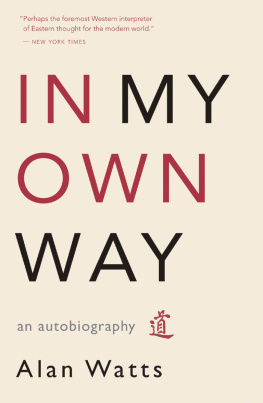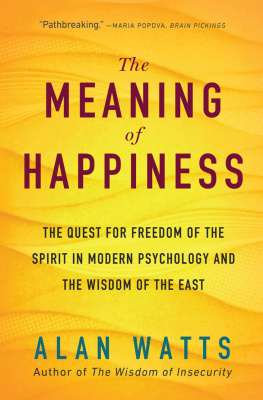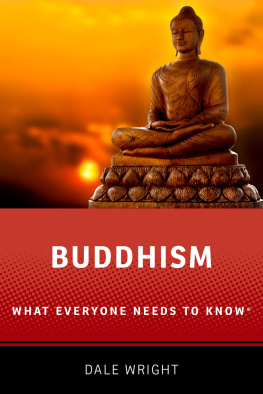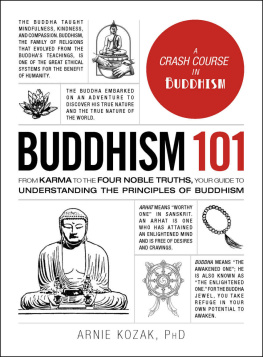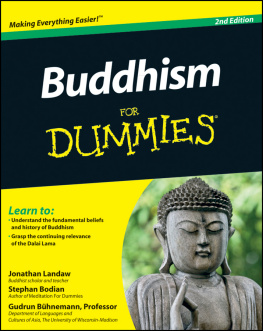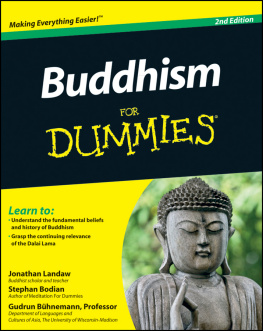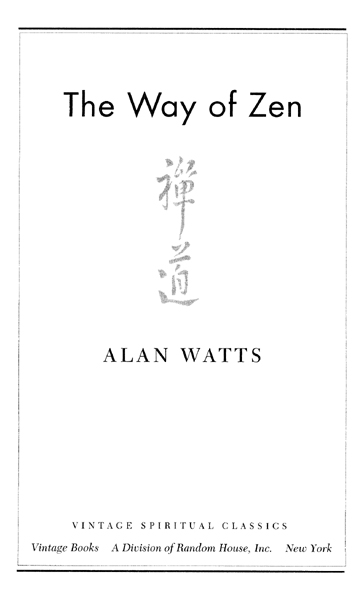ALSO BY ALAN WATTS
AVAILABLE FROM VINTAGE
Behold the Spirit
Beyond Theology
The Book
Cloud-Hidden, Whereabouts Unknown
Does It Matter?
In My Own Way
Nature, Man and Woman
Psychotherapy East and West
The Supreme Identity
This Is It
Copyright 1957 by Pantheon Books Inc.
Copyright renewed 1985 by Mary Jane Watts
All rights reserved under International and Pan-American
Copyright Conventions. Published in the United States by Vintage Books,
a division of Random House, Inc., New York, and simultaneously in
Canada by Random House of Canada Limited, Toronto. Originally
published in the United States in hardcover by Pantheon Books, a division
of Random House, Inc., New York, in 1957. First published
in paperback by Vintage Books in 1989.
The Library of Congress cataloged
the first Vintage Books edition as follows:
Watts, Alan, 19151973.
The way of Zen = [Zend] / Alan W. Watts 1st ed.
p. cm.
Parallel title in Japanese characters.
Reprint. Originally published: New York: Pantheon, 1957.
eISBN: 978-0-307-78434-6
1. Zen Buddhism. I. Title. II. Title: Zend.
[BQ9265.4.W38 1989]
294.3927dcl9 88-40502
www.randomhouse.com
v3.1
To
TIA, MARK, AND RICHARD
who will understand it all the better
for not being able to read it.
C ONTENTS
L IST OF I LLUSTRATIONS
.
.
.
.
P REFACE
During the past twenty years there has been an extraordinary growth of interest in Zen Buddhism. Since the Second World War this interest has increased so much that it seems to be becoming a considerable force in the intellectual and artistic world of the West. It is connected, no doubt, with the prevalent enthusiasm for Japanese culture which is one of the constructive results of the late war, but which may amount to no more than a passing fashion. The deeper reason for this interest is that the viewpoint of Zen lies so close to the growing edge of Western thought.
The more alarming and destructive aspects of Western civilization should not blind us to the fact that at this very time it is also in one of its most creative periods. Ideas and insights of the greatest fascination are appearing in some of the newer fields of Western sciencein psychology and psychotherapy, in logic and the philosophy of science, in semantics and communications theory. Some of these developments might be due to suggestive influences from Asian philosophy, but on the whole I am inclined to feel that there is more of a parallelism than a direct influence. We are, however, becoming aware of the parallelism, and it promises an exchange of views which should be extremely stimulating.
Western thought has changed so rapidly in this century that we are in a state of considerable confusion. Not only are there serious difficulties of communication between the intellectual and the general public, but the course of our thinking and of our very history has seriously undermined the common-sense assumptions which lie at the roots of our social conventions and institutions. Familiar concepts of space, time, and motion, of nature and natural law, of history and social change, and of human personality itself have dissolved, and we find ourselves adrift without landmarks in a universe which more and more resembles the Buddhist principle of the Great Void. The various wisdoms of the West, religious, philosophical, and scientific, do not offer much guidance to the art of living in such a universe, and we find the prospects of making our way in so trackless an ocean of relativity rather frightening. For we are used to absolutes, to firm principles and laws to which we can cling for spiritual and psychological security.
This is why, I think, there is so much interest in a culturally productive way of life which, for some fifteen hundred years, has felt thoroughly at home in the Void, and which not only feels no terror for it but rather a positive delight. To use its own words, the situation of Zen has always been
Above, not a tile to cover the head;
Below, not an inch of ground for the foot.
Such language should not actually be so unfamiliar to us, were we truly prepared to accept the meaning of the foxes have holes, and the birds of the air have nests; but the Son of Man hath not where to lay his head.
I am not in favor of importing Zen from the Far East, for it has become deeply involved with cultural institutions which are quite foreign to us. But there is no doubt that there are things which we can learn, or unlearn, from it and apply in our own way. It has the special merit of a mode of expressing itself which is as intelligibleor perhaps as bafflingto the intellectual as to the illiterate, offering possibilities of communication which we have not explored. It has a directness, verve, and humor, and a sense of both beauty and nonsense at once exasperating and delightful. But above all it has a way of being able to turn ones mind inside out, and dissolving what seemed to be the most oppressive human problems into questions like Why is a mouse when it spins? At its heart there is a strong but completely unsentimental compassion for human beings suffering and perishing from their very attempts to save themselves.
There are many excellent books about Zen, though some of the best are out of print or otherwise difficult to obtain. But as yet no onenot even Professor Suzukihas given us a comprehensive account of the subject which includes its historical background and its relation to Chinese and Indian ways of thought. The three volumes of Suzukis Essays in Zen Buddhism are an unsystematic collection of scholarly papers on various aspects of the subject, enormously useful for the advanced student but quite baffling to the general reader without an understanding of the general principles. His delightful Introduction to Zen Buddhism is rather narrow and specialized. It omits the essential information about the relation of Zen to Chinese Taoism and Indian Buddhism, and is in some respects rather more mystifying than it need be. His other works are studies of special aspects of Zen, all of which require general background and historical perspective.
R. H. Blyths Zen in English Literature and Oriental Classics is one of the best introductions available, but it is published only in Japan and, again, lacks the background information. As a series of rambling and marvelously perceptive observations, it makes no attempt to give an orderly presentation of the subject. My own Spirit of Zen is a popularization of Suzukis earlier works, and besides being very unscholarly it is in many respects out of date and misleading, whatever merits it may have in the way of lucidity and simplicity. Christmas Humphreys Zen Buddhism, published only in England, is likewise a popularization of Suzuki and, once more, does not really begin to put Zen in its cultural context. It is written in a clear and sprightly fashion, but the author finds identities between Buddhism and Theosophy which I feel to be highly questionable. Other studies of Zen by both Western and Asian authors are of a more specialized character, or are discussions of Zen propos of something elsepsychology, art, or cultural history.
In default, then, of a fundamental, orderly, and comprehensive account of the subject, it is no wonder that Western impressions of Zen are somewhat confused, despite all the enthusiasm and interest which it has aroused. The problem, then, is to write such a bookand this I have tried to do since no one who understands the subject better than I seems willing or able to do so. Ideally, I suppose, such a work should be written by an accomplished and recognized Zen master. But at present no such person has sufficient command of English. Furthermore, when one speaks from within a tradition, and especially from within its institutional hierarchy, there is always apt to be a certain lack of perspective and grasp of the outsiders viewpoint. Again, one of the biggest obstacles to communication between Japanese Zen masters and Westerners is the absence of clarity as to difference of basic cultural premises. Both sides are so set in their ways that they are unaware of the limitations of their means of communication.
Next page
![Watts The way of Zen = [Zendō]](/uploads/posts/book/242017/thumbs/watts-the-way-of-zen-zend.jpg)


